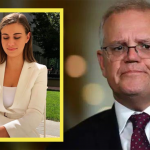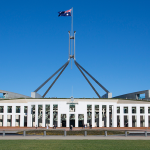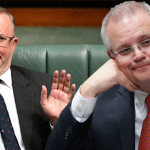
UPDATED: 27 Oct 2022. It’s been more than six months since Brittany Higgins alleged she had been sexually assaulted at Parliament House by a Liberal Party staffer. Higgins’ brave decision to publicly share her own trauma was followed by a stream of similar accounts from women working in politics, calling out the toxic, misogynistic culture in which they are routinely harassed and assaulted. You can read a full list of allegations since February here.
At the time, Prime Minister Scott Morrison announced a bunch of inquiries and investigations to address the culture at Parliament House. Six months on, what’s the status of the action steps Morrison and his Coalition Government said they would take?
Here’s an update of what’s been achieved.
Jump to:
- Inquiry into Workplace Culture at Parliament House
- Inquiry into Complaints Handling at Parliament House
- Internal Coalition Inquiry
- Inquiry into the Prime Minister’s Office
- ACT Police Criminal Charges
- National Women’s Safety Summit 2021
- Respect@Work Policy Amendments
Simon Birmingham and Kate Jenkins Inquiry into Workplace Culture at Parliament House
Finance Minister Simon Birmingham was tasked with an inquiry into the culture within Parliament House. In March 2021, he appointed Sex Discrimination Commissioner Kate Jenkins as the lead – she interviewed current and former staff and parliamentarians for a report detailing what changes need to be made to ensure Parliament House as a workplace “sets the standard for the nation”.
Status: The Jenkins report, “Set the Standard: Report on the Independent Review into Commonwealth Parliamentary Workplaces”, was released on 30 November 2021. The report makes 28 recommendations across 5 areas: Leadership; Diversity & Inclusion; Performance; Accountability; Safety & Wellbeing.
Key recommendations from the report include:
- Establishing a independent Implementation Group to oversee all the recommendations in the report (Recommendation 2) and a review of the implementation within 18 months (Recc 3)
- Setting gender and diversity balance targets across all roles in Parliament House (Recc 5) including Members of Parliament (Recc 6)
- Annual reporting on the composition of Parliamentarians and staff working at Parliament House (Recc 7)
- Establish an Office of Parliamentarian Staffing & Culture within 12 months to provide HR support (Recc 11) – currently staffing matters are handled by the Department of Finance. This Office should then oversee recruiting, behaviour standards, managing misconduct etc.
- Establish a Joint Standing Committee on Parliamentary Standards within 6 months to develop clear and consistent Codes of Conduct for Parliamentarians, Staff and anyone on the grounds – to be implemented within 12 months (Recc 21)
- Establish an Independent Parliamentary Standards Commission within 12 months to handle complaints, disclosures, make findings about those complaints and recommend sanctions (Recc 22)
- Developing specific alcohol policies to restrict availability and minimise harm (Recc 28)
The report is supported by both major parties – they will now go through it and come back with a formal response, explaining what recommendations they will implement.
Stephanie Foster’s Report into Complaints Handling at Parliament House
Prime Minister Morrison tasked Stephanie Foster (deputy secretary of the Department of Prime Minister & Cabinet (DPC)) with reviewing the complaints handling process for staff at Parliament House. This inquiry was a direct result of Higgins’ assault allegations, to assess whether there is sufficient support for staffers who make conduct complaints.
Status: Foster’s report was finalised in June 2021. It found that the existing process did not guarantee any accountability nor provide enough safeguards for those who may file a complaint. It made a list of 10 recommendations for overhauling the process, including:
- A new process for reporting and investigating serious incidents to an independent body, rather than internal hierarchies (Higgins’ allegations were investigation by her then-boss, Linda Reynolds, who was also the accused’s superior);
- Trauma-informed support services to be made available to those who need it;
- Providing tailored education and training about sexual harassment and assault for all who work in Parliament House; and
- Restrictions on after-hours access of Parliament House.
Foster recommended that a taskforce should be set up to implement the new system, and that it should be funded until June 2022. Morrison agreed to all 10 recommendations in the report.
The Internal Coalition Party Room Cultural Inquiry
As many of the behavioural complaints raised in the wake of Higgins’ allegations related to men from the Federal Liberal and National Parties, Morrison asked for an internal review of the complaints process and cultural issues specifically within the Coalition. This was led by a backbencher, MP Celia Hammond. Many commentators, politicians and the public questioned whether Hammond was the best person to lead this project, given she had previously expressed “staunch anti-feminist views.”
Status: No progress on this inquiry yet. However, as it’s an internal review it may not ever be made public.
Phil Gaetjens Inquiry into the Handling of Higgins’ Allegations
From the very beginning, one major question has been asked of the Liberal Party: who knew what, and when? Linda Reynolds, Michaelia Cash, and staff within the Prime Minister’s office have given varying accounts of what they knew about an alleged rape.
Phil Gaetjens is the head of the DPC, and Morrison asked him to investigate who in the Prime Minister’s Office knew about the alleged rape and when they found out.
Status: This has been one of the most controversial and complicated investigations – in March, Morrison was even accused of lying to Parliament about it. Gaetjen’s investigation was paused on 27 August 2021 to allow the criminal trial against the Liberal staffer accused by Higgins. Even once this report is finalised, it may never be made public.
Phil Gaetjens has suspended his review into who knew what in the PMO in regards to Brittany Higgins’s allegations, after receiving legal advice: pic.twitter.com/jhpS0XyX1p
— Amy Remeikis (@AmyRemeikis) August 30, 2021
ACT Police Criminal Inquiry into Accused Liberal Staffer
In February 2021 Higgins began working with the AFP on a criminal investigation into the incident. As the alleged assault took place in Canberra, it was handed over to the ACT Police. On 6 August 2021, ACT Police issued a court summons to the accused (now former) Liberal staffer in question.
Status: Bruce Lehrmann has been charged with sexual intercourse without consent. He has entered a plea of “not guilty” and denies that “any form of sexual activity took place whatsoever.”
On 27 October, it was revealed one juror brought their own research into the deliberation room. Even though the trial was complete and the jury had already spent almost a week deliberating on the verdict, the judge was forced to discharge the entire jury. The trial will likely have to start again, from the very beginning, with a brand new jury.
The National Summit on Women’s Safety 2021
In April 2021, Queensland Premier Annastacia Palaszczuk wrote to Morrison calling for a national women’s ‘summit’ to address the challenges and inequalities women in Australia face. While she initially had the idea for a summit on preventing domestic and family violence in 2016, Palaszczuk said: “Now is the time for women’s voices throughout Australia to be heard. I honestly believe that if we are going to achieve equality in this country, now is the time.”
Morrison liked the idea and backed it, although at some point the government pivoted back to the “women’s safety” angle this was expanded to encompass topics like financial insecurity, policing and justice responses, service availability in regional areas, and multicultural experiences. The ‘National Summit on Women’s Safety’ 2021 was originally to take place in-person in July, but the two-day virtual event finally went ahead on 6 September.
Status: While the program was warmly received, Morrison was criticised for making himself the keynote speaker – rather than nominating a woman. The contents of his speech were also slammed. Now that the Summit is over, The Department of Social Services and the Office for Women at the Department of the Prime Minister and Cabinet are in charge of coming up with a National Plan to Reduce Violence against Women and their Children. They will take into account information and submission from the Summit, as well as directly working with some of the delegates, for the new plan which will commence in 2023.
Scott has just finished his opening keynote address at the Women’s Safety Summit in which he appropriated private disclosures from survivors to leverage his own image.
— Grace Tame (@TamePunk) September 6, 2021
Gee, I bet it felt good to get that out.
Amending the Sex Discrimination Act & the Respect@Work Report
While the Respect@Work report was not commissioned because of Higgins’ allegations, it does represent an opportunity for the government to act on some of the issues facing women and victims, dragged to the surface by Higgins’ story. In June 2018 the Government (led by then-Prime Minsiter Malcolm Turnbull) asked Sex Discrimination Commissioner Kate Jenkins to conduct a National Inquiry into sexual harassment. She delivered the final report in March 2020 – just a couple of weeks after Higgins’ allegations. It includes 55 recommendations across a wide range of areas and action points.
In June 2021, the Government introduced the Sex Discrimination and Fair Work (Respect at Work) Amendment Bill 2021. It proposed that some of the report’s recommendations be officially made on three relevant laws: the Fair Work Act, Sex Discrimination Act, and the Australian Human Rights Commission Act 1986.
Status: The bill was passed in early September 2021, so the proposed changes will be made to those laws. But let’s be very clear: not all 55 recommendations are legislative ones.
Jenkins made 12 legislative recommendations in the Respect@Work report. The government implemented 6 of these, which broadly cover:
- Making it clearer in the relevant Acts that sexual harassment in the workplace is prohibited and a sackable offence
- Allowing employees 24 months to lodge a complaint with the Australian Human Rights Commission (previously six months)
- Specifying that sexual harassment is a workplace health & safety issue, bringing it under the remit of the Fair Work Commission
- Extending the definitions of work and workplaces to cover things like insecure work and working from home
- Closes the loophole that previously allowed public officials (judges, parliamentarians and their staffers) to be exempt from the laws
If you want to check for yourself, these are from recommendations 16, 20, 21, 22, 29 and 30.
However Labor and The Greens proposed that the Bill also include the other six recommendations. This was knocked back by the Government, with the support of One Nation Senators Pauline Hanson and Malcolm Roberts.
The major amendments that were not included are:
- Changing the Sex Discrimination Act to require employers to take action to prevent sexual harrassment as much as possible (this is know as ‘positive duty’)
The Government’s reasoning for not including these amendments is essentially that they go beyond what the legislation should be required to do. Their belief is that employers should take it upon themselves to prevent sexual harassment, and that making this a prohibited, sackable offense is the Government’s responsibility (which they have done). - Changing the Human Rights Commission Act, allowing unions to bring sexual harassment claims to court instead of individuals. This would let the unions take on the costs and risks on behalf of the victim
Liberal governments usually don’t like to expand the powers of bodies, like the Human Rights Commission, unless it is absolutely necessary – it’s unsurprising they didn’t include this. - Increasing funding to women’s centres and services who cater to victims of sexual harassment, and making sure services are widely accessible
This is likely down to financial factors alone, which could arguably be dealt with separately at Budget time.
FWIW, Labor has said it will take that last point (Recommendation 49) to the next Federal election, and will introduce this if it wins.





